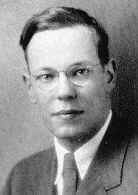Distinguished Faculty AwardBROOKS OTIS, L.H.D. '77

BROOKS OTIS, L.H.D. '77
Member of the faculty
1935-1957
October 5, 1996
Brooks Otis was born in Boston, June 8, 1908, to Edward and Marion Faxon Otis. He graduated from Phillips Exeter Academy, received his B.A. from Harvard in 1929, M.A. from Harvard in 1930, and Ph.D. from Harvard in 1935. He taught classical languages at Earlham College from 1930-32, and came to teach at Hobart and William Smith directly after receiving his Ph.D. He started as assistant professor of classics and lecturer in sociology. In 1939 he became a full professor of classics and continued teaching at the Colleges until 1957, when he left to chair the Classics Department at Stanford and later at University of North Carolina at Chapel Hill.
Kathryn Cook, a past recipient of Distinguished Faculty Award, calls Professor Otis, “the most outstanding scholar/teacher by far, in every way, whom I have known at our Colleges.” She goes on to say that, “he was recognized in his field of classics even while he was with us, but he was also a polymath. It was his many-sided competence at high academic level that enabled him to originate and continue to master-mind the coordinate disciplines of natural, social sciences, and humanities into the Western Civilization program. You can scarcely understand how remarkable it was for Hobart and William Smith. It was one of the earliest and most thorough programs of its kind. Its procedures became the model for others.”
Just as he was highly regarded by his colleagues, so too was Otis esteemed by his former students. Associate Professor Emeritus Roger Farrand ’49, a student of Dr. Otis shortly after World War II, recalled that “his ability to mesmerize us veterans while lecturing about Plato, Virgil, St. Augustine, etc., was awesome. He introduced us to great books, and although we were all awed by him, we felt that he could be approached and would answer questions at length.”
Another former student recounted the staunch support Dr. Otis gave his students: “I was a few chapel credits short of graduation, but I had been told that at the faculty meeting at which degrees were voted, Dr. Otis threatened to resign if I were denied a degree. I graduated!”
He was a member of Trinity Church in Geneva, active on the National Council of Religion in Higher Education, and wrote extensively about issues involving “the problem of Christianity and the answer of Christianity.” He won a Guggenheim and a Fulbright fellowship, published numerous books and articles, and was a guest lecturer and visiting professor at several universities during his years at the Colleges. In June of 1977, he received a L.H.D. degree from Hobart and William Smith in belated recognition of his incredible career and contribution to our Colleges. He died in July, 1977, in North Carolina.
